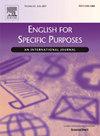TED-Ed animations as resources for learning academic formulas
IF 2.7
1区 文学
Q1 LINGUISTICS
引用次数: 0
Abstract
Knowledge of academic formulas is essential for second language learners, particularly those studying English for academic purposes, as it greatly affects their comprehension and expression in academic settings. Yet, resources facilitating the learning of these formulas are very limited. To address this gap, this study examines the potential of TED-Ed animations for learning academic formulas by analyzing the variety and occurrence of those formulas in a corpus comprising 1,513 such animations. The findings show that TED-Ed animations contain a diverse range and a high density of academic formulas, particularly those core to both spoken and written academic discourse, with a notable 97 % of them occurring within the corpus. Also, extensively viewing these animations would offer learners repeated encounters with various academic formulas, potentially helping enhance their knowledge of these items. These findings highlight the value of TED-Ed animations as resources for learning academic formulas, particularly through extensive viewing practices, and reaffirm academic nature of such animations from a phraseological perspective. Additionally, this study reveals a higher occurrence and variety of spoken academic formulas compared to their written counterparts within TED-Ed animations, providing further insights into the lexical characteristics of such discourse.
ted动画作为学习学术公式的资源
对于第二语言学习者来说,学术公式的知识是必不可少的,尤其是那些以学术为目的学习英语的人,因为它极大地影响了他们在学术环境中的理解和表达。然而,促进这些公式学习的资源是非常有限的。为了解决这一差距,本研究通过分析由1,513个这样的动画组成的语料库中这些公式的多样性和出现情况,研究了TED-Ed动画在学习学术公式方面的潜力。研究结果表明,TED-Ed动画包含了多样化和高密度的学术公式,特别是那些对口语和书面学术话语至关重要的公式,其中97%的公式出现在语料库中。此外,广泛观看这些动画将为学习者提供各种学术公式的反复接触,潜在地帮助他们提高这些项目的知识。这些发现突出了TED-Ed动画作为学习学术公式的资源的价值,特别是通过广泛的观看实践,并从短语学的角度重申了这些动画的学术性质。此外,本研究还揭示了TED-Ed动画中口语学术公式的出现频率和多样性高于书面学术公式,这为进一步了解此类话语的词汇特征提供了依据。
本文章由计算机程序翻译,如有差异,请以英文原文为准。
求助全文
约1分钟内获得全文
求助全文
来源期刊

English for Specific Purposes
LINGUISTICS-
CiteScore
5.70
自引率
8.00%
发文量
41
审稿时长
62 days
期刊介绍:
English For Specific Purposes is an international peer-reviewed journal that welcomes submissions from across the world. Authors are encouraged to submit articles and research/discussion notes on topics relevant to the teaching and learning of discourse for specific communities: academic, occupational, or otherwise specialized. Topics such as the following may be treated from the perspective of English for specific purposes: second language acquisition in specialized contexts, needs assessment, curriculum development and evaluation, materials preparation, discourse analysis, descriptions of specialized varieties of English.
 求助内容:
求助内容: 应助结果提醒方式:
应助结果提醒方式:


